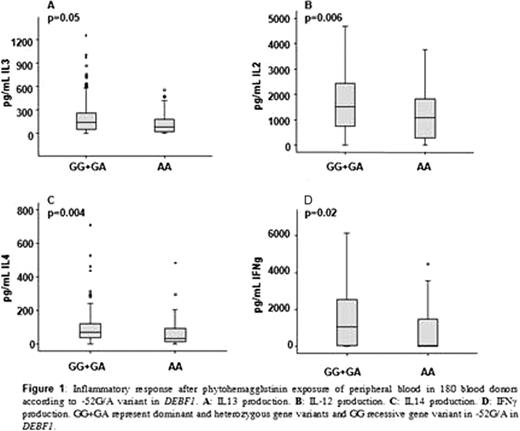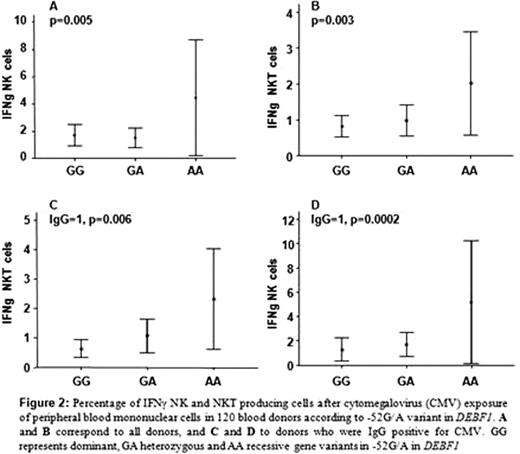Abstract
Abstract 3052
Innate immunity, by initiating an inflammatory response and by activating the adaptive immunity, is crucial in the onset of aGvHD after allo-SCT. DEBF1 belongs to the defensins family, which are antimicrobial peptides produced by leukocytes and a variety of mucosa and epithelial cells. They act as key effectors of innate immunity and regulate adaptive immunity; in the intestinal tract, they present antimicrobial activity, and low levels appear in intestinal chronic inflammation. DEBF1 has in the promoter region three gene variants (-52G/A, -44G/C, -20G/A) which are associated with infectious diseases and with chronic inflammation, however incongruent results have been obtained by different groups. We aimed to see whether there is an impact of gene variants of DEBF1 on aGVHD and in the inflammatory response in healthy blood donors. Population study consisted of 490 adults donor-patients pairs who underwent HLA identical sibling allo-SCT. All patients were diagnosed with hematological malignancies. Median age was 45 (range, 16–69), 33% were in advanced phase of disease, and 38% received a reduced intensity conditioning regimen. Association results showed that recessive -52A gene variant in DEBF1 when present in the donor was associated with higher aGvHD grades III-IV (24% vs 11%, p=0.023). At multivariate analysis, this gene variant retained the highest significance (OR=2.11, p=0.02). We performed functional studies in 180 blood donors for this gene variant to find out if it influenced the global production of IL12, IL13, IL15, IL17, and of Th1/Th2 cytokines after phytohemagglutinin (PHA) and cytomegalovirus (CMV) exposure. Further, we determined the percentage of IFN γ producing NK cells, NKT cells, CD8+ cells and CD4+ by cells after CMV exposure in 120 blood donors according to this gene variant. After PHA exposure, donors carrying this variant had lower production of IL13 (81 pg/mL vs 135 pg/mL, p=0.05), IL2 (1072 pg/mL vs 1527 pg/mL, p=0.006), IL4 (31 pg/mL vs 67 pg/mL, p=0.004) and IFN γ (31 pg/mL vs 67 pg/mL, p=0.02) (Figure 1), indicating a lower anti-inflammatory response. These cytokines play an important role in the aGvHD development, as IL13 is known by its anti-inflammatory properties, IL2 enhances T reg proliferation reducing aGvHD, IL4 is involved in the reduction of GvHD by NKT cells and IFN γ can present immunosuppressive activity inhibiting GvHD. This lower anti-inflammatory response could explain the higher incidence of severe aGvHD for this recessive -52A gene variant. Curiously, the recessive gene variant, when it was present in the donor, was associated with a lower incidence of cause of death by infection or sepsis in the same cohort of patients submitted to allo-SCT (12.5% of individuals carrying this variant died by infection or sepsis vs 87.5% of death by other causes in individuals with this variant, p=0.04). Functional studies showed that after CMV exposure, this variant presented much higher percentage of IFN γ producing NK cells (p=0.005) and IFN γ producing NKT cells (p=0.03); when the analysis was restricted to IgG positive donors for CMV, this association was stronger (p=0.0002 and p=0.006, for % of IFN γ producing NK cells and NKT cells, respectively) (Figure 2), indicating a different role for this variant after CMV infection. These results indicate an important impact of the -52A recessive gene variant in DEBF1 in the clinical outcome after allo-SCT in terms of GvHD and infection, which might be due to modifications in the anti-inflammatory response pattern.
Disclosures:
No relevant conflicts of interest to declare.
Author notes
*
Asterisk with author names denotes non-ASH members.
© 2011 by The American Society of Hematology
2011



